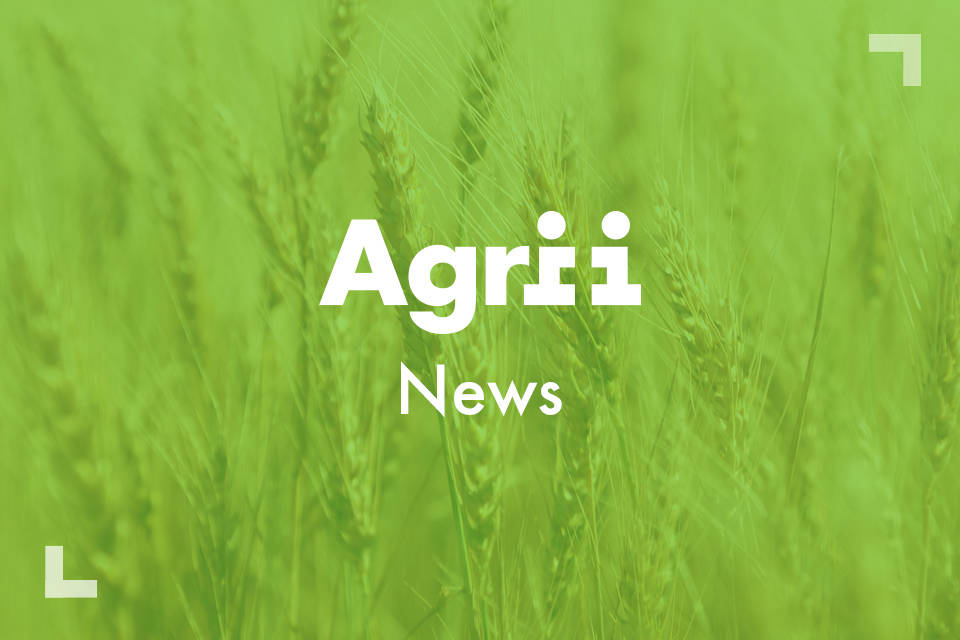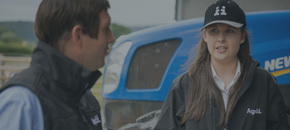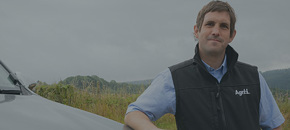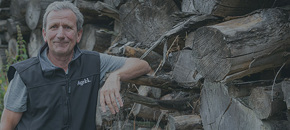
Making Sustainability Work on the North Hampshire Down
News - 03.03.21
Net Zero farming is already a reality at Faccombe Estates on the Hampshire-Berkshire border near Newbury, with a net sequestration of over 1800 tonnes CO2/year.
Making Sustainability Work on the North Hampshire Down
Net Zero is already a reality at Faccombe Estates on the Hampshire-Berkshire border near Newbury, with their comprehensive 2020 Farm Carbon Calculator report showing a net sequestration of over 1800 tonnes CO2/year.
But director Al Brooks and his team are not content to rely on their substantial areas of forestry, woodland, hedgerows and uncultivated field margins to offset emissions from the estate’s mixture of farming, commercial shooting and property.
Instead, they are intent on cutting emissions wherever they can as part of a determined drive for practical sustainability; a drive based on steady gains from thoroughly joined-up thinking to deliver progressively greater environmental benefits alongside financial security.
Nowhere is this more evident than in the way Mr Brooks, assistant manager James Higginbotham and Agrii agronomist, Andrew Richards have been transforming the mixed farming business over the past four years.
The sheep enterprise, which has long been part of an estate with large areas of ecologically precious chalk downland, has been completely re-structured and integrated far more effectively into the 1000ha arable rotation.
The fodder cover crops and short-term grass leys accompanying this have done much to improve the workability and resilience of the chalk-with-flint and clay cap soils. As has moving to minimum tillage – with direct drilling where possible – and regular organic manuring.
Equally significant has been an increasingly diverse cropping mix, including winter rye, spelt, linseed and poppies alongside wheat and oilseed rape. Unusually for a downland farm, spring barley has been abandoned altogether; and, even though soil organic matter improvement is a priority, all the cereal straw is now baled and sold.
“Our whole focus is on ensuring all our enterprises complement one another in every way they can, environmentally as well as commercially,” Mr Brooks stresses. “This is our route to true sustainability in the face of considerable climatic challenges, not to mention legislative pressures, environmental demands and Brexit.
“Not least of these challenges is land running up to 330m, lying cold in the winter and slow to warm in the spring. Our unique set of ‘little’ micro-climates mean it can be pouring with rain in one part of the estate yet full sun all day less than half a mile away. What’s more, our soils have tended to lack structure; need serious liming despite over-lying chalk; and drought out too easily.”
Central to the farming improvements made over the past four years has been replacing the loss-making 1000-strong ewe flock with a 1400 ewe lamb-rearing business. Purchased each October, the lambs are grazed outdoors for 10 months and sold as breeding stock the following July. While the original flock was pastured almost entirely outside the arable rotation, the sheep now utilise a range of stubble turnip and fodder radish-based crops sown into the stubbles after harvest.
“This change has turned around our sheep finances,” explains Mr Brooks. “It has also taken the grazing pressure off our downland, generated good commercial as well as soil management value from winter covers and provided automatic manuring across the rotation.
Choosing crops for greater flexibility
“Completely dropping spring barley for its disappointingly poor performance and growing linseed and now poppies instead means greater spring drilling flexibility to accommodate the lamb grazing. This spreads our workloads too; especially important with the additional 320ha of arable ground we now farm on contract locally.
“The 100ha of short-term leys we have in the rotation also work well on a number of fronts,” he adds. “They allow us to move the lambs off the covers and on to good grazing before our later-growing permanent pastures are able to support them in the spring, and provide useful back-end grazing ahead of the winter fodder crops.
“On top of this, they give us an extra earning opportunity from hay-making from any surplus grass in the summer and the flexibility to manage our chalk downlands as well as we can for their wonderful biodiversity. All the while, of course, they enable us to bear down hard on blackgrass and brome in the arable rotation wherever they rear their ugly heads.”
Moving towards a min-till system
Moving away from heavy reliance on the plough and power harrow drilling four years ago to a min-till system based around a Horsch Terrano and Vaderstad Rapid drill has been another important ingredient in the overall sustainability improvement recipe at Faccombe.
Quite apart from the contribution made to soil carbon retention, min-tilling hugely increased work rates, allowing the team to successfully drill over 600ha last spring in little more than a week.
“Both the Rapid and the John Deere 750A we also now have allow us to direct drill,” Mr Richards says. “This season, for instance, the Rapid allow us to sow a good area of wheat directly into land coming out of linseed.
“However, the soils here don’t self-structure well and you can’t under-estimate the pressure a large number of grazing lambs folded onto fodder crops over the winter put on them. Add the short spring drilling windows we often have and the last thing we need is to have to force seed straight into wet, packed-down soil.
“So, we are keeping as much flexibility as we can in the system. Where we need metal at depth, a low disturbance Grange toolbar has been really useful. With it, we’re able to subsoil precisely where it’s needed while minimising soil surface movement. And we can mount it in front of either our cultivator or drill.
“Baling and selling all the cereal straw simplifies crop establishment as well as reducing slug problems and preserving as much residual nitrogen as possible for our following fodder and combinable crops,” he notes. “More than replacing this with a range of much better sources of decently friable organic matter to build soil health and resilience does necessitate having sufficient cultivation flexibility to incorporate it, though.”
Flexibility is key to success
Notwithstanding the min-till switch, the Faccombe team maintain the ultimate in establishment flexibility in the form of a second-hand plough and mounted power harrow drill in the shed. For a minimal cost in depreciation, they see this as essential ‘get out of jail’ insurance that will more than pay for itself in a single season if it’s ever needed in desperation.
Flexibility is also the watchword in the 1000ha of arable cropping and the 80ha of Stewardship blocks and margins grown across the estate. Integrated as closely as possible with large areas of woodland and game cover, these serve one of the top commercial shoots in the country; simplify and speed crop management; and, support the greatest wildlife diversity.
“Although we continue to grow some second wheats, we have worked with Andrew and his Agrii seed and marketing colleagues to replace a good proportion of these with winter rye and spelt this season,” Mr Brooks says. “If they work out as well as we hope, we’ll be growing a lot more in the future. They spread our risk and workloads, require lower inputs and, every bit as importantly with Brexit, are grown on contract for secure local markets.
“Linseed has done us well, but we’re keen to keep our spring break cropping options open by growing poppies as well. Like the rye and spelt, they suit our ground, are relatively low input, contracted for local markets and make sense financially. Having them harvested for us also takes pressure off our combining workload.”
These crops complement the 400ha wheat of currently being grown – also on contract – for milling and seed on the yield-limited ground; extra premium-earning E-wheats, MV Frederica and Axioma as well as Group 1 mainstays like KWS Zyatt. In great testament to the progress being made, some of wheats delivered a previously unheard-of 10t/ha in 2019 against a five-year average of around 8.5t/ha.
A Whole Farm Approach
Soil, cropping and grassland improvements have also allowed overall fertiliser use to be cut substantially. Changes to the tractor fleet, reduced cultivations and a move from 24 to 30m tramlines – not to mention GPS autosteer – have resulted in a 20% increase in fuel efficiency and far greater tyre life. And greater cropping diversity and more efficient combining have cut drying needs noticeably. All of which have made positive contributions to reducing the business’ carbon footprint as well as its improving financial performance and resilience.
“As pleased as we are with the progress we’ve made to date, we’re only a little way down the road on our journey to greater sustainability yet,” Mr Brooks insisted. “We can see so much room for improvement in so many areas.
“Carbon accounting across our entire business has been hugely valuable in establishing benchmarks for the future. However, we have to accept there are some emissions we can’t reduce without compromising all-important performance and focus instead on those we can to make up for them. We must also appreciate that things that save carbon may not necessarily be as positive for other important elements in our sustainability equation.
“Getting all the individual gains to add-up to the future-proofing that is our overriding aim depends on balancing everything we do in the most integrated ways we can, based on the best scientific understanding and practical experience. Every member of our team – within the estate and beyond – is playing their part.”
Join Our Community

Agrii X
We love engaging with clients and partners. Give us a follow and let's share stories for the community.

Agrii Instagram
A picture paints a thousand words. Follow us on Instagram to see what we are up to.

Agrii Facebook
Follow us on the worlds biggest social media site for the latest news and events straight to your feed.

Agrii LinkedIn
If you are all about the business, connect with us on LinkedIn to build your network
Stay In Touch

Journal Sign-Up
Receive email updates on topical news and information from around Agrii and UK Farming.

Listen To Our Podcasts
Listen to the Tramlines Podcast. Fortnightly chat about agriculture and trials with your host Tony Smith.

Agrii Insights
Read essential agri intelligence for profitable farming.

Find an Event
Join us for our upcoming events and tours.



